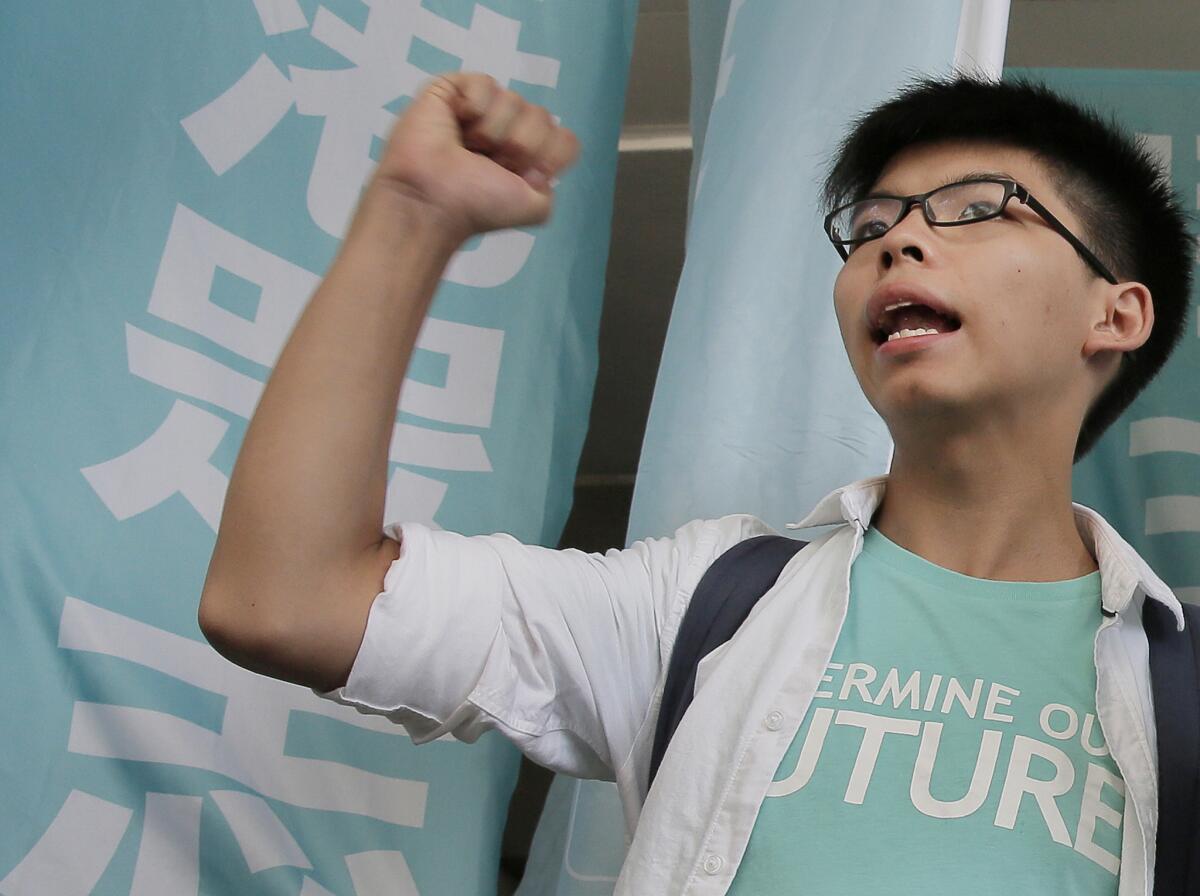Court convicts youthful leader of Hong Kong’s pro-democracy protests

Reporting from Hong Kong — Joshua Wong, the teenage leader who is the face of the youthful pro-democracy movement in Hong Kong, was convicted Thursday of participating in an unlawful assembly that snowballed into a massive sit-in known as the Umbrella Movement.
Two fellow youth movement leaders, Alex Chow, 25, and Nathan Law, 23, were also convicted on various charges. Both are former presidents of the Hong Kong Federation of Students, which organized the class boycott that led to mass demonstrations in 2014 demanding more direct public participation in the election of Hong Kong’s chief executive.
For nearly three months, thousands of protesters filled the financial district and other parts of the city demanding democratic reforms in China’s most significant public demonstrations since the Tiananmen Square protests in 1989.
During the trial, prosecution painted the student leaders as reckless colluders in a violent act of rebellion; Wong and his co-defendants argued that they had been driven to civil disobedience as a result of the government’s increasing clamp-downs on the right to demonstrate in public.
“No matter what the price or penalty is, we’ll keep fighting,” Wong said outside the courthouse. “We know facing off [against] the Chinese Communist Party is a long battle for democracy.”
The verdict, which came after nearly 10 weeks of deliberation by Magistrate June Cheung, could rekindle public dissatisfaction with the current Hong Kong administration in its waning months, as chief executive Leung Chun-ying mulls a second term.
In April, Law and Wong formed a new political party to run for the Legislative Council elections in the fall. At 19, Wong is two years too young to run for office; Law filed for his candidacy Monday. But Thursday’s conviction may bar him from running in September.
Hong Kong, a former British colony of 7.3 million people which is now a semiautonomous Chinese territory, has maintained an independent judiciary under a separate constitution, which is to remain in force until 2047.
Under the constitution, the territory is guaranteed the right to vote for its leader eventually. However, in August 2014, the standing committee of China’s National People’s Congress decided to limit the choice of candidates for Hong Kong’s highest office to candidates handpicked by a pro-Beijing committee.
Beijing’s decision prompted a class boycott organized by the student leaders and escalated into the storming of the plaza known as Civic Square. The demonstrations ended with the arrests of Chow, Law, Wong and 70 others.
During the student leaders’ prolonged detention, demonstrators amassed and faced off against riot police, who tried and initially failed to clear the streets. The emboldened demonstrators then took over major roadways in encampments. Parts of Admiralty, Causeway Bay and Mong Kok were occupied and remained closed to traffic for nearly 80 days.
The city’s streets ultimately were cleared on court orders. But little political change has been achieved since.
While police early in 2015 arrested a total of 48 people for their involvement in the pro-democracy protests, only Wong, Chow, Law and a dozen others have been prosecuted so far.
Wong was acquitted in June of two counts of obstructing a police officer during an earlier protest against mainland China’s claim of “complete jurisdiction” over the Chinese territory.
All told, 955 protesters were arrested during the Umbrella Movement protests when authorities cleared out the encampments.
The three remain free on bail until sentencing scheduled for Aug. 15. For the charges on which the student leaders were convicted, the maximum sentence is five years.
Law is a special correspondent.
More to Read
Sign up for Essential California
The most important California stories and recommendations in your inbox every morning.
You may occasionally receive promotional content from the Los Angeles Times.










